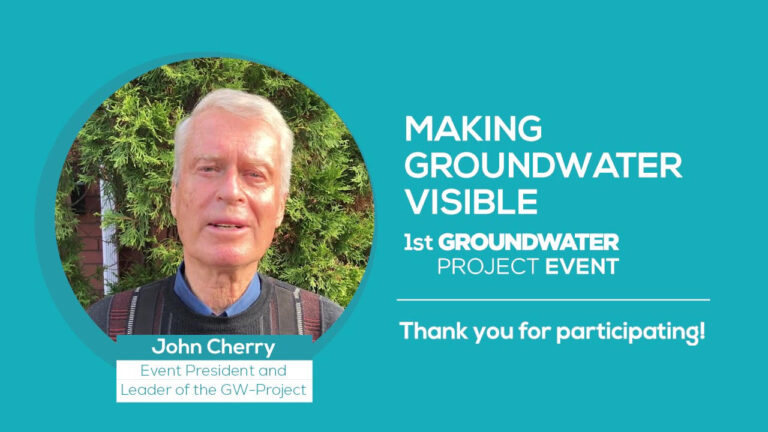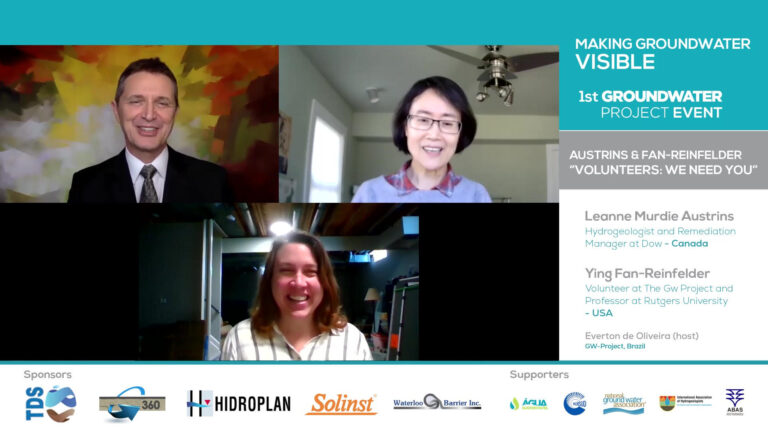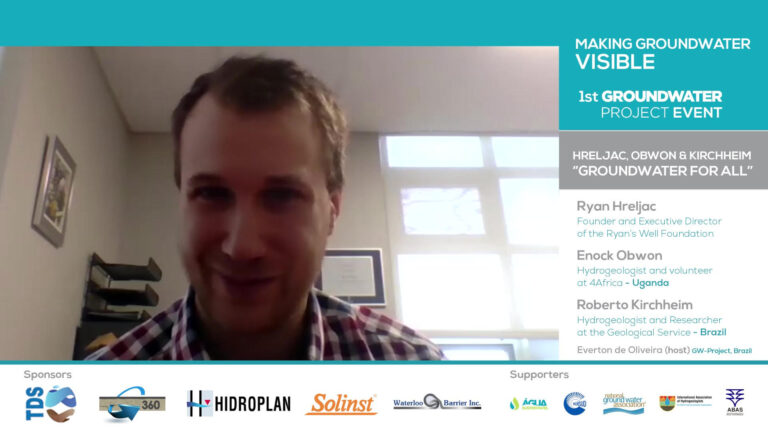
On February 26th our 1st Groundwater Project Event: Making Groundwater Visible ended with 1517 subscribers on the event, +1000 subscribers on the YouTube channel and over 4000 views on the talks until now. All because the excellent speakers had the dexterity to involve the public with stories of their careers and the passion for groundwater.
The week of February 17 started with the Groundwater for Children panel, Dr. Peter Russell involved the audience with sympathy and gave us the honor of singing a song whose theme could not be other than “groundwater”, with all his wisdom Peter said a phrase that may seem like a cliché, but it still is an absolute truth: “teaching the children then helps the parents know about it“. Dr Edson Grandisoli in turn brought important data into his speech: “we have around 2.2 to 2.5 billion that lack access to quality water. By 2025 two-thirds of the world’s population may be facing shortages. We have to think about what kind of citizen we would like to form to tackle this problem of water scarcity“.
The second talk on February 17th was given by Professor Sergey Pozdniakov, he talked about his career and the groundwater in Russia, it was a real class and very interesting. Professor Sergey mentioned that in Russia “mostly we use groundwater for public water supply, less for industry and less for agriculture, but we are still between the 15 nations with the largest annual groundwater extraction”.
The Volunteers: we need you panel was composed of two captivating women who have done magnificent work as volunteers, Leanne Austrins and Dr. Ying Fan. According to Dr. Fan “everybody should have access to knowledge independent of where you come from, how much money you have and that is the only way for this humanity to go forward” and Leanne completed “it is great to have a dream, but if you cannot put that dream into practical sense then it just remains your dream“.

If you missed it live, you can still watch the recorded version here.
On February 24th we had the Groundwater and intensive use panel with Dr. Dinesh Singhal and Dr. Manuel Sapiano. Dr. Singhal brought the data that “about 90% of total groundwater extracted in India (˜250 BCM) is used for irrigation. And the groundwater based irrigation economy is >US$ 60 billion” and Dr. Sapiano told us about the groundwater in Malta: “in our country the natural water availability is 70 m3/cap/day and mainly this derives from groundwater resources“. Then we move on to the Arabic Groundwater meeting, Dr. Khalil Al Samarrail said “climate change also affects water resources in the MENA countries (…) adding stress to that found by previous problems. Warming in the MENA region is higher than global warming and rainfall across the region decreases. These two factors lead to a decrease in water availability“. According to Dr. Abdalraheem Huwaysh “with an Arab version of the Groundwater Project, with the Arabic language, even in the future, it would be very useful for the dissemination of the knowledge about groundwater“.
You can watch all the talks here.
The last talks at the event were Groundwater for All and Closing: all in one. Dr. Roberto Kirchheim mentioned in his talk “to do something socially relevant was very important for me as a geologist. So I graduated and I felt ‘well, I don’t want to go to prospect diamonds somewhere. I want to do something that does an impact’” and Ryan Hreljac told us wise and inspirational words “I really thought that one well would make all the difference in the world. So I kept on fundraising, kept on working to try to raise money for this well. I did chores for my folks, when that wasn’t enough I did chores for my neighbors, I ended up going back to my school and doing little fundraisers (…) and slowly people started catching on, saying ‘if Ryan can do that, why can’t I?’ And it grew, and a year later we were actually able to build that well in Northern Uganda. If you find something you care about, raise your hand, volunteer and see what happens”. To close the Groundwater for All panel, Enock said “groundwater in Uganda is gold. (…) our biggest resource is groundwater“.
Professor Marco Petitta also showed inspiration in his speech “there is a great honor also for me to participate and to have the possibility to give some contribution to this amazing project, amazing vision that John Cherry is sharing with all of us and all the people involved in groundwater science and groundwater management and also groundwater perspective in the future. I am convinced that this is the right way for joining the scientists and the society under the sentence – making groundwater visible“. Professor George P. Karatzas said that it is important to teach groundwater in the elementary school “we have to go to the elementary school level with some simple books or maybe some videos, cartoons, and try to make the kid understand what is groundwater because groundwater is the invisible part of the hydrological cycle“.
Check out all the talks on our YouTube Channel and subscribe so you don’t miss the next videos of The Groundwater Project. Events like these are only made possible by donations from our supporters, companies, and individual sponsors. Consider making a monthly or one-time donation, help us keep making groundwater visible.

